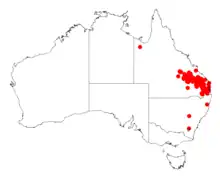Acacia glaucocarpa
Acacia glaucocarpa, commonly known as the hickory wattle[2] and the feathery wattle,[3] is a species of Acacia native to eastern Australia.[4]
| Hickory wattle | |
|---|---|
| Scientific classification | |
| Kingdom: | Plantae |
| Clade: | Tracheophytes |
| Clade: | Angiosperms |
| Clade: | Eudicots |
| Clade: | Rosids |
| Order: | Fabales |
| Family: | Fabaceae |
| Subfamily: | Caesalpinioideae |
| Clade: | Mimosoid clade |
| Genus: | Acacia |
| Species: | A. glaucocarpa |
| Binomial name | |
| Acacia glaucocarpa | |
 | |
| Occurrence data from AVH | |
The shrub or tree typically grows to a height of 2.5 to 10 metres (8 to 33 ft) and has fissured grey to grey-brown mottled bark. It faintly ridged terete branchlets.
A. glaucocarpa has a wide distribution in open forest or woodland area in southeastern Queensland from approximately 80 kilometres (50 mi) west of Emerald south to close to the New South Wales border, it is common near Kingaroy and Ipswich. It is known to occur within protected areas and is found in many localities. It grows on sandstone or sedimentary rocks, often in deep soil.[1]
The current population is not known but is stable with at least 40 mature individuals in one stand of Queensland plants and seeds stored as a conservation measure.[5]
It is also used as a low maintenance ornamental plant with attractive foliage and a mass of flowers in autumn. It grows well inland and is frost and greywater tolerant.[3]
See also
References
- Malcolm, P. (2012). "Acacia glaucocarpa". IUCN Red List of Threatened Species. 2012: e.T19892743A19998475. doi:10.2305/IUCN.UK.2012.RLTS.T19892743A19998475.en. Retrieved 12 November 2021.
- "Hickory wattle – Acacia glaucocarpa". Wetlandinfo. Queensland Government. Retrieved 11 September 2016.
- "Acacia glaucocarpa – Feathery Wattle". Gardening with Angus. Retrieved 11 September 2016.
- "Acacia glaucocarpa Maiden & Blakely, Proc. Roy. Soc. Queensland 38: 120; pl. 19 facing page 122 (1927)". World Wide Wattle. 12 July 2016. Retrieved 11 September 2016.
- "Acacia glaucocarpa". IUCN Red List of Threatened Species. Retrieved 11 September 2016.
